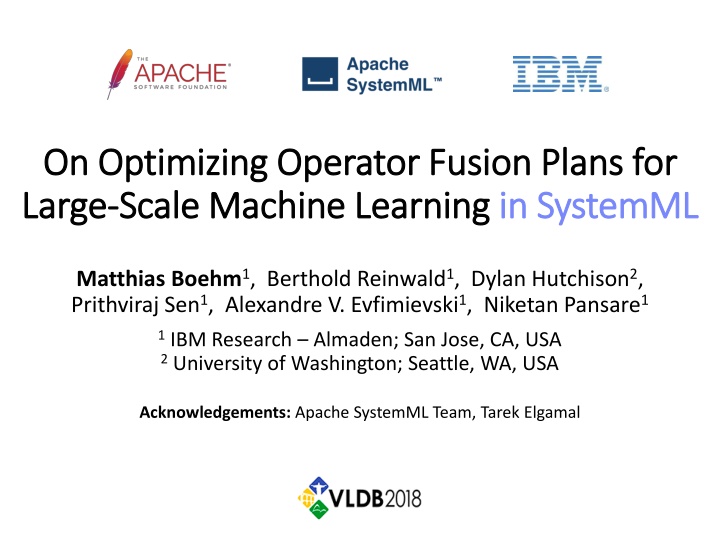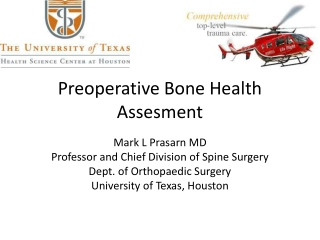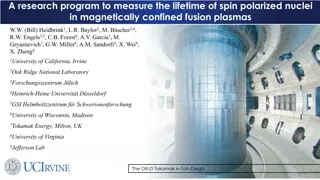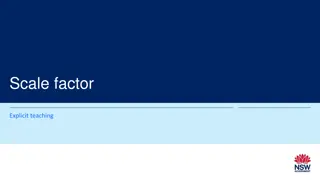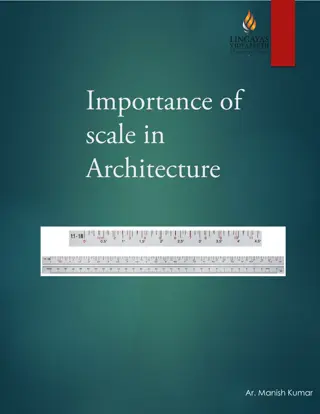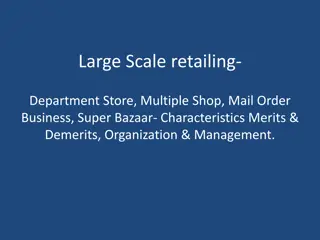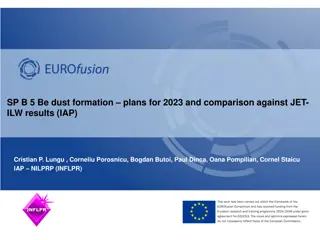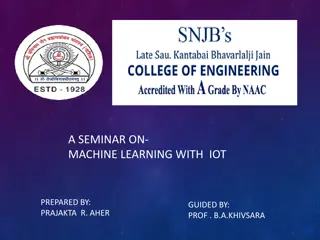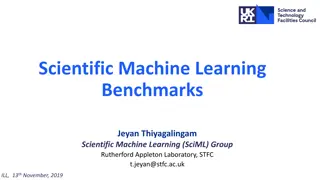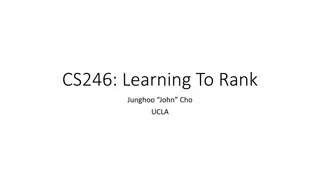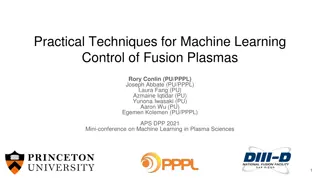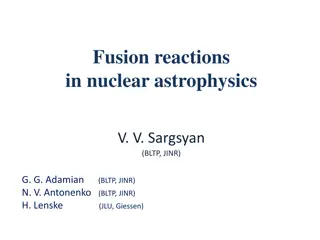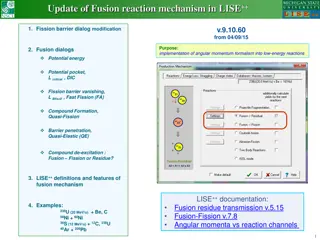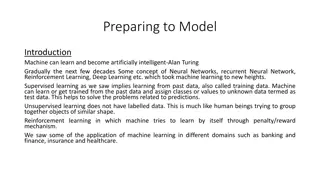Optimizing Operator Fusion Plans for Large-Scale Machine Learning in SystemML
The research focuses on optimizing fusion plans for large-scale machine learning in SystemML. It discusses the motivation behind fusion opportunities, the need for optimizing fusion plans, and system architecture considerations. The study emphasizes the challenges in heuristic fusion planning for complex DAGs and aims to propose a principled approach for efficient fusion planning.
Download Presentation

Please find below an Image/Link to download the presentation.
The content on the website is provided AS IS for your information and personal use only. It may not be sold, licensed, or shared on other websites without obtaining consent from the author.If you encounter any issues during the download, it is possible that the publisher has removed the file from their server.
You are allowed to download the files provided on this website for personal or commercial use, subject to the condition that they are used lawfully. All files are the property of their respective owners.
The content on the website is provided AS IS for your information and personal use only. It may not be sold, licensed, or shared on other websites without obtaining consent from the author.
E N D
Presentation Transcript
On Optimizing Operator Fusion Plans for On Optimizing Operator Fusion Plans for Large Large- -Scale Machine Learning Scale Machine Learning in in SystemML SystemML Matthias Boehm1, Berthold Reinwald1, Dylan Hutchison2, Prithviraj Sen1, Alexandre V. Evfimievski1, Niketan Pansare1 1IBM Research Almaden; San Jose, CA, USA 2University of Washington; Seattle, WA, USA Acknowledgements: Apache SystemML Team, Tarek Elgamal
Motivation: Fusion Opportunities Motivation: Fusion Opportunities State-of-the art ML systems DAGs of linear algebra (LA) operations and statistical functions Materialized intermediates ubiquitous fusion opportunities b) Single-Pass t(X)%*%(X%*%v) t(t(X%*%v)%*%X) a) Intermediates c) Multi-Aggregates sum(X*Y*Z) d) Sparsity Exploitation
A Case for Optimizing Fusion Plans A Case for Optimizing Fusion Plans Problem: Fusion heuristics poor plans for complex DAGs (cost/structure), sparsity exploitation, and local/distributed operations Goal: Principled approach for optimizing fusion plans #1 Materialization Points (e.g., for multiple consumers) #2 Sparsity Exploitation (and ordering of sparse inputs) Y + X * (U %*% t(V)) sparse-safe over X #3 Decisions on Fusion Patterns (e.g., template types) #4 Constraints (e.g., memory budget and block sizes) Search Space that requires optimization
System Architecture System Architecture (Compiler Integration & (Compiler Integration & Codegen Codegen Architecture) Architecture) Practical, exact, cost-based optimizer [CIDR 17] (w/ fuse-all heuristic) - Lacked maintainability - Poor plans for complex DAGs and local/distributed operations Templates: Cell, Row, MAgg, Outer w/ different data bindings
Codegen Codegen Example L2SVM (Cell/ Example L2SVM (Cell/MAgg MAgg) I ) I ... write g L2SVM Inner Loop write h b(-) 1: while(continueOuter & iter < maxi) { 2 #... 3: while(continueInner) { 4: out = 1-Y* (Xw+step_sz*Xd); 5: sv = (out > 0); 6: out = out * sv; 7: g = wd + step_sz*dd - sum(out * Y * Xd); 8: h = dd + sum(Xd * sv * Xd); 9: step_sz = step_sz - g/h; 10: }} ... b(+) ua(RC,+ ) ua(RC,+ ) b(*) b(*) b(*) b(*) b(*) b(> ) b(+) 0 b(-) b(+) 1 wd b(*) # of Vector Intermediates Base (w/o fused ops): 10 Fused (w/ fused ops): 4 b(+ ) dd b(*) step_sz Xd Xw Y
Codegen Codegen Example L2SVM (Cell/ Example L2SVM (Cell/MAgg MAgg) II ) II Template Skeleton Data access, blocking Multi-threading Final aggregation public final class TMP25 extendsSpoofMAgg { public TMP25() { super(false, AggOp.SUM, AggOp.SUM); } protected voidgenexec(double a, SideInput[] b, double[] scalars, double[] c, ...) { double TMP11 = getValue(b[0], rowIndex); double TMP12 = getValue(b[1], rowIndex); double TMP13 = a * scalars[0]; double TMP14 = TMP12 + TMP13; double TMP15 = TMP11 * TMP14; double TMP16 = 1 - TMP15; double TMP17 = (TMP16 > 0) ? 1 : 0; double TMP18 = a * TMP17; double TMP19 = TMP18 * a; double TMP20 = TMP16 * TMP17; double TMP21 = TMP20 * TMP11; double TMP22 = TMP21 * a; c[0] += TMP19; c[1] += TMP22; } } # of Vector Intermediates Gen (codegen ops): 0
Codegen Codegen Example Example MLogreg MLogreg (Row) (Row) MLogreg Inner Loop (main expression on feature matrix X) 1: Q = P[, 1:k] * (X %*% v) 2: H = t(X) %*% (Q - P[, 1:k] * rowSums(Q)) public final class TMP25 extendsSpoofRow { public TMP25() { super(RowType.COL_AGG_B1_T, true, 5); } protected voidgenexecDense(double[] a, int ai, SideInput[] b, double[] c,..., int len) { double[] TMP11 = getVector(b[1].vals(rix),...); double[] TMP12 = vectMatMult(a, b[0].vals(rix),...); double[] TMP13 = vectMult(TMP11, TMP12, 0, 0,...); double TMP14 = vectSum(TMP13, 0, TMP13.length); double[] TMP15 = vectMult(TMP11, TMP14, 0,...); double[] TMP16 = vectMinus(TMP13, TMP15, 0, 0,...); vectOuterMultAdd(a, TMP16, c, ai, 0, 0,...); } protected voidgenexecSparse(double[] avals, int[] aix, int ai, SideInput[] b, ..., int len) {...} }
Candidate Exploration Candidate Exploration (by example (by example MLogreg MLogreg Row template) Row template) Memo Table Memo Table for partial fusion plans (candidates) OFMC Template Fusion API Open Fuse, Merge Close OFMC Algorithm Bottom-up Exploration (single-pass, template- agnostic) Linear space and time
Candidate Selection I Candidate Selection I (Plan Partitions and Interesting Points) (Plan Partitions and Interesting Points) #1 Determine Plan Partitions Materialization Points M Connected components of fusion references Root and input nodes Optimize partitions independently #2 Determine Interesting Points Materialization Point Consumers: Each data dependency on materialization points considered separately Template / Sparse Switches: Data dependencies where producer has templates that are non-existing for consumers Optimizer considers all 2|M i| plans (with |M i| |Mi|) per partition
Candidate Selection II Candidate Selection II (Costs and Constraints) (Costs and Constraints) Overview Cost Model Cost partition with analytical cost model based on peak memory and compute bandwidth Plan comparisons / fusion errors don t propagate / dynamic recompilation #3 Evaluate Costs #1: Memoization of already processed sub-DAGs #2: Account for shared reads and CSEs within operators #3: Account for redundant computation (overlap) DAG traversal and cost vectors per fused operator (with memoization of pairs of operators and cost vectors) #4 Handle Constraints Prefiltering violated constraints (e.g., row template in distributed ops) Assign infinite costs for violated constraints during costing
Candidate Selection III Candidate Selection III (Enumeration Algorithm (Enumeration Algorithm MPSkipEnum MPSkipEnum and Pruning) and Pruning) #5 Basic Enumeration Linearized search space: from - to * for( j in 1:pow(2,|M i|) ) q = createAssignment(j) C = getPlanCost(Pi, q) maintainBest(q, C) #6 Cost-Based Pruning Upper bound: cost CU of best plan q* (monotonically decreasing) Opening heuristic: evaluate FA and FNR heuristics first Lower bound: CLS (read input, write output, min compute) + dynamic CLD (materialize intermediates q) skip subspace if CU CLS + CLD #7 Structural Pruning Observation: Assignments can create independent sub problems Build reachability graph to determine cut sets During enum: probe cut sets, recursive enum, combine, and skip
Experimental Setting Experimental Setting Setup 1+6 node cluster (head 2x4 Intel Xeon E5530, 64GB RAM; 6workers 2x6 Intel Xeon E5-2440, 96GB RAM, peak 2x32GB/s 2x115GFLOP/s, 10Gb Ethn) Modern scale-up server (2x20 Intel Xeon Gold 6138, 768GB RAM, peak 2x119 GB/s 2x1.25TFLOP/s) Java 1.8.0, Hadoop 2.7.3, Spark 2.2.0 (client w/ 35GB driver, 6 executors w/ 65 GB and 24 cores, aggregate cluster memory: 234 GB) Baselines SystemML 1.0++ (Feb 2018): Base, Fused (hand-coded, default), Gen (optimizer), and heuristics FA (all) and FNR (no redundancy) Julia 0.6.2 (Dec 13 2017): LLVM code generation, Julia (without fusion) and JuliaGen (fusion via dot syntax) TensorFlow 1.5 (Jan 26 2018): TF (without fusion), and TFGen (fusion via TensorFlow XLA), limited support for sparse
Operations Performance Operations Performance Cell Template: sum(X*Y*Z) sparse (0.1) dense Outer: sum(X*log(U%*%t(V)+1e-15)) Row: t(X)%*%(w*(X%*%v)) TF w/ manual rewrite t(t(w*(X%*%v))%*%X): 9.2 s to 1.6 s (compared to Gen 283ms) dense 20K x 20K, rank 100
L2SVM End L2SVM End- -to to- -End Performance End Performance (20 outer/ inner iterations, reg., tight eps) (20 outer/ inner iterations, reg., tight eps) Local and Distributed [seconds] Data Base Fused* Gen FA FNR 108 x 10, D Airline78, D Mnist8m, S 2*108 x 100, D 2*108 x 103, S Mnist80m, S 446 151 203 276 105 156 37 24 113 44 26 115 92 45 116 #1 Heuristics struggle w/ hybrid plans 1218 1481 1593 895 1066 1114 347 373 552 1433 2205 1312 539 575 896 Julia Comparison Dataset: 108 x 10 (8GB) Hand-tuned fusion script for JuliaGen
ALS ALS- -CG End CG End- -to to- -End Performance End Performance (20 outer/20 inner iterations, rank 20) (20 outer/20 inner iterations, rank 20) ALG-CG Representative for many matrix factorization algorithms Requires sparsity exploitation in loss computation and update rules Local single node [seconds] Data Base Fused* Gen FA FNR 104 x 104, S (0.01) 105 x 105, S (0.01) 106 x 106, S (0.01) Netflix Amazon Books 426 23,585 N/A N/A N/A 20 96 860 1,026 17,335 25 80 722 789 7,420 215 13,511 N/A N/A N/A 226 12,353 N/A N/A N/A (8,026,324 x 2,330,066; sparsity=0.0000012) #2 Heuristics struggle w/ sparsity exploitation #3 Heuristics struggle w/ complex DAGs (see paper)
Conclusions Conclusions Summary Exact, cost-based optimizer for operator fusion plans over DAGs of LA ops End-to-end compiler and runtime integration into SystemML Additional contributions (in the paper) Fused operators for sparsity-exploitation, and compressed matrices Graceful approximation, plan and operator caching, and rewrites Experiments for operations, compilation overhead, algorithms Conclusions Significant end-to-end improvements due to generality and cost-awareness Low compilation overhead due to fast compiler, pruning, and op/plan caching Optimizing fusion plans is a corner-stone of future declarative ML systems Available open source in SystemML https://github.com/apache/systemml
Backup: Compilation Overhead Backup: Compilation Overhead Java Class Compilation and Loading w/ operator cache Partitioning and Pruning - Total codegen overhead: 55ms 366ms 350ms 112ms 1067ms 491ms
